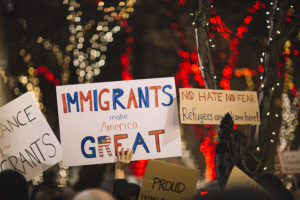Poor Policy: Humanists Decry “Wealth Test” for Migrants
 Photo by Nitish Meena on Unsplash
Photo by Nitish Meena on Unsplash White House Deputy Director of Homeland Security Ken Cuccinelli. White House Advisor and Donald Trump’s son-in-law Jared Kushner. Former congressman Jason Chaffetz (R-UT). All vocal opponents of inclusive immigration policies and all people whose ancestors would have been turned away if Donald Trump’s latest immigration policy was in effect when they came to our borders.
In late 2018 the Department of Homeland Security (DHS) announced a proposed regulation, and in August of 2019, DHS published the final version of the regulation that would deny entry to migrants who may depend on federal public assistance programs. And the new regulation’s cruelty doesn’t end at our borders. As Quartz geopolitics reporter Annalisa Merelli points out, immigrants who have resided in the United States “who have used food stamps or been hospitalized for long-term care through Medicaid can now be denied a green card.” Last week, as the rule took effect, the Department of Justice formed a new section in its Office of Immigration Litigation “dedicated to denaturalizing foreign-born citizens” based on recommendations from DHS.
Immediately, lawsuits were filed against the administration in an effort to halt this miscarriage of justice, but the Trump administration turned to the Supreme Court, asking that the rule take effect regardless of any outstanding legal challenges or state freezes. In a five-four decision in January of 2020, the Supreme Court allowed the rule to go into effect in forty-nine states, excluding Illinois due to an outstanding judicial injunction. On Friday, February 21, the Supreme Court issued an additional decision lifting the final injunction and allowing national implementation of the rule.
The rule change began to affect vulnerable communities even before its official implementation, as noncitizens began dropping out of benefit programs in fear of immigration consequences.
In her dissent from the most recent decision, Justice Sonia Sotomayor noted that the federal government has sought emergency action from the Supreme Court in an unprecedented number of cases. Sotomayor argued that these emergency applications disrupt the “normal appellate process,” taking authority from the state courts who are deliberating on these policy questions.
Aside from the inherent cruelty in punishing those in need, the facts of this issue robustly dispute the Trump administration’s argument. According to a 2019 report from the nonpartisan Center on Budget and Policy Priorities (CBPP), immigrants who utilize public benefits have high rates of employment over time, and the large majority of “those who have used benefits at any point were employed a majority of the time, and even more were either employed or had an employed spouse.” Most immigrants who take advantage of these programs only do so temporarily, using them as the programs were originally intended: short-term support for people who have been struck by misfortune or whose circumstances find them otherwise unable to support themselves 100 percent.
The impact of this policy will be far-reaching. Immigrants are key to a number of sectors across the American economy. For example, immigration bolsters the falling national birth rate, ensuring that as the baby boomer generation ages out of the workforce, the national ratio of workers to retirees remains stable.
At the most recent meeting of the American Humanist Association Board of Directors, the organization expanded its scope of advocacy work to include immigration justice. The resolution demands that the humanity of refugees and migrants be front and center in our immigration policy, stating, in part, that
Policies which unduly restrict immigration or discriminate against immigrants are not only contrary to a modern, pluralistic society, but serve to disadvantage the country and its citizens.
“I came here with nothing.” So begin so many stories of the success immigrants to the United States have achieved since the country’s founding. From nothing comes something—a break, a helping hand, hard work and determination, and the interconnectedness of people sharing a common land, an economy, and a similar dream of a better life. To halt that process and turn people away or cut them off is not something humanists are willing to rationalize.
